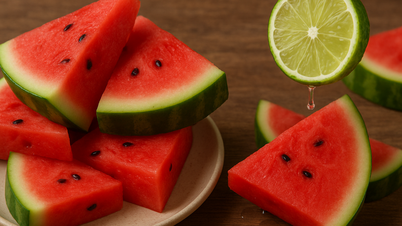Watermelon - scientific name is Citrullus Lanatus, has a hard rind, red flesh inside, lots of water, and a sweet taste when eaten. According to Healthline, the main ingredients in watermelon are water, accounting for 91% and carbs with 7.5%.
100 grams of watermelon includes:
- Calories: 30
- Water: 91%
- Protein: 0.6 grams
- Carbs: 7.6 grams
- Sugar: 6.2 grams
- Fiber: 0.4 grams
- Fat: 0.2 grams
What happens if you eat watermelon regularly?
Watermelon is juicy and sweet, so it is suitable for use as a thirst-quenching dish or dessert, especially on hot summer days. A post on the website of Hong Ngoc Hospital points out the benefits of eating watermelon regularly.
Hydrate the body
With the main ingredient being water, accounting for 91%, eating watermelon helps keep the body hydrated and maintain electrolyte levels.
Eating watermelon regularly can reduce symptoms of dehydration after work or exercise.
Prevent cancer
Watermelon contains Lycopene - a compound that can prevent cancer, especially gastrointestinal cancer. Lycopene reduces the risk of developing cancer cells by reducing IGF growth. In particular, increased IGF is one of the causes of stimulating abnormal cell growth that is at risk of transforming into cancer cells.
Furthermore, watermelon also contains Cucurbitacin E - a compound that inhibits tumor growth and prevents the metastasis of cancer cells.

Eating watermelon regularly helps rehydrate and provides many vitamins and minerals necessary for the body (Photo: istock)
Watermelon is rich in antioxidants
Watermelon contains many antioxidants that can prevent the effects of free radicals, slow down the degeneration process and protect the body's organs. Among them:
- Vitamin C helps strengthen the immune system and limit cell damage caused by free radicals.
- Lycopene protects retinal and nerve cells from the effects of free radicals.
- Carotenoids are plant compounds including beta-carotene and alpha-carotene, which when taken into the body will be converted into vitamin A.
- Cucurbitacin E helps control inflammatory responses in the body
Prevent macular degeneration
The lycopene compound in watermelon also appears in some parts of the eye to prevent inflammation and oxidative stress to the eye. Lycopene acts as an antioxidant and anti-inflammatory compound, thereby preventing and slowing down age-related macular degeneration.
Digestive support
Watermelon has a high water content and a very rich fiber content, so it is a fruit that can increase the motility of the digestive system.
The amount of water in watermelon neutralizes gastric juice, thereby helping to reduce epigastric pain, belching, and heartburn. The abundant amount of water and fiber also helps to retain moisture and increase stool volume, thereby reducing the risk of constipation.
Increase sperm quantity and quality
Both watermelon and watermelon seeds contain a fair amount of zinc, which is a trace element necessary for the functioning of the thyroid gland and testicles. Adding foods rich in zinc can improve testosterone levels, increasing both the quantity and quality of sperm.
Therefore, men should regularly supplement watermelon to enhance physiological function and support the treatment of diseases such as premature ejaculation and erectile dysfunction.
Support weight loss, beautify skin
Watermelon is sweet, mild and very low in calories. With its main ingredient being water, eating watermelon helps increase metabolism, eliminate toxins and fat from the body. Eating watermelon also gives a feeling of fullness for a long time, thereby helping to reduce cravings, making it an effective weight loss aid.
More than water, with its abundant water content, eating watermelon helps maintain ideal moisture for the skin, thereby making your skin moist and smooth, limiting the risk of oiliness or peeling.
Vitamin A in watermelon also helps rejuvenate the skin, reduce the number of wrinkles on the face, and helps hair grow faster, improving the condition of tangled, split ends. Meanwhile, vitamin C stimulates the body to produce collagen - a protein that can support skin tissue, maintaining the strength and shine of hair.
How to eat watermelon effectively
Although it is good for your health, you should only eat a maximum of 300 grams of watermelon per day and divide it into several meals, do not eat too much at once. With watermelon juice, you should only drink a maximum of 300 ml so that your body can absorb and metabolize the nutrients and minerals that watermelon provides.
To keep the watermelon fresh, after peeling it, you can put it in a sealed box with a lid and store it in the refrigerator at an average temperature of 8 - 10 degrees Celsius. This temperature will ensure the watermelon is fresh and retains its flavor.
You should eat cut melons within 1 - 2 days to maintain their freshness and flavor.
Source





![[Photo] Prime Minister Pham Minh Chinh chairs conference on anti-smuggling, trade fraud, and counterfeit goods](https://vphoto.vietnam.vn/thumb/1200x675/vietnam/resource/IMAGE/2025/5/14/6cd67667e99e4248b7d4f587fd21e37c)


























































































Comment (0)